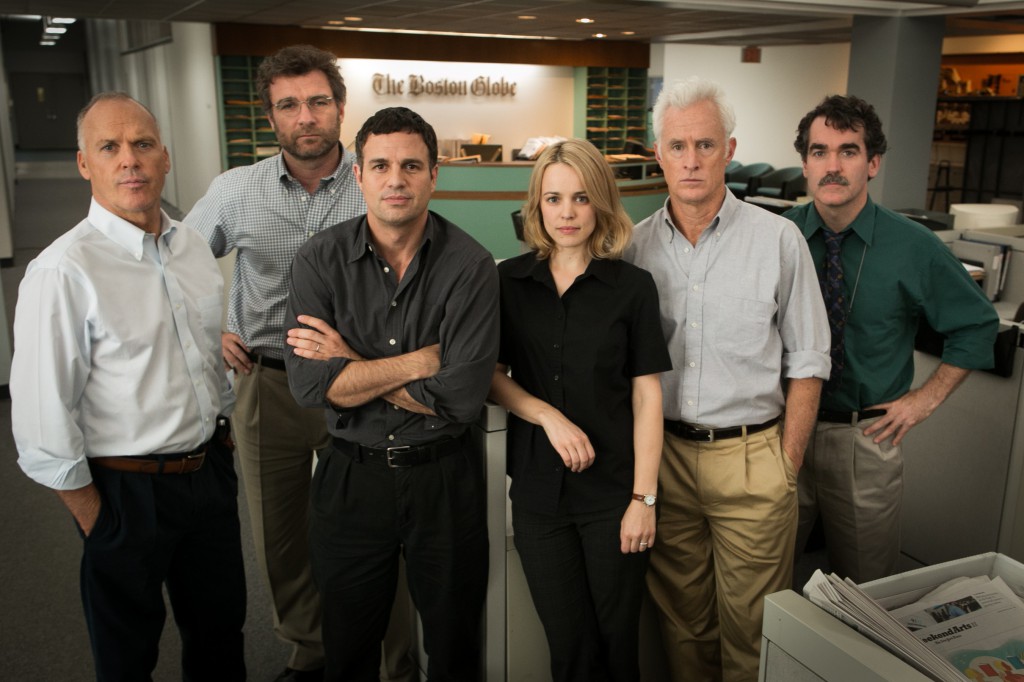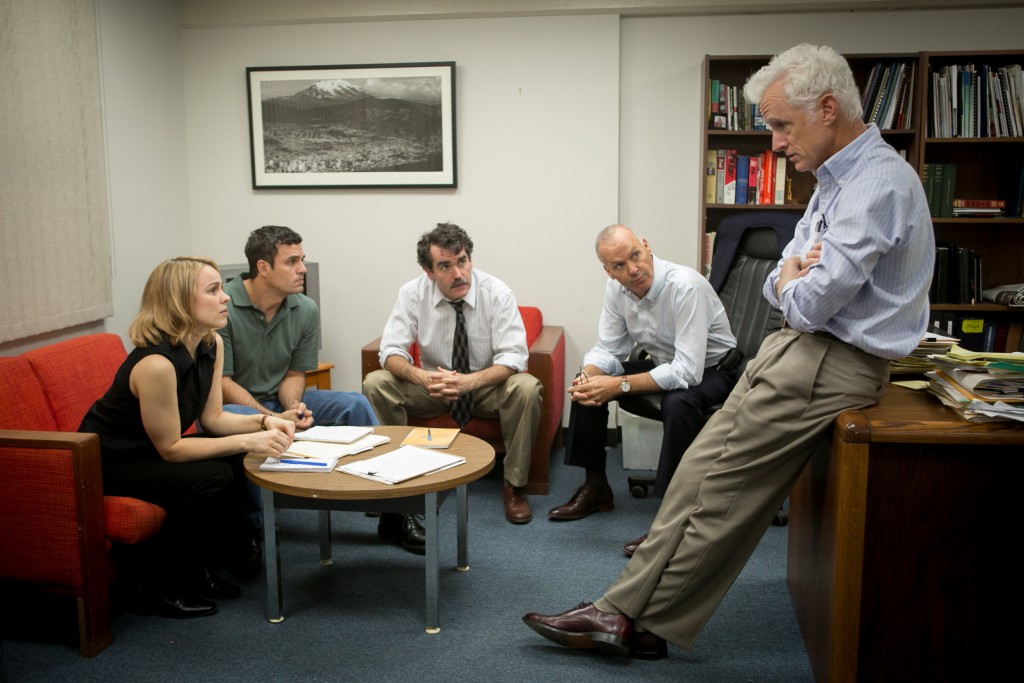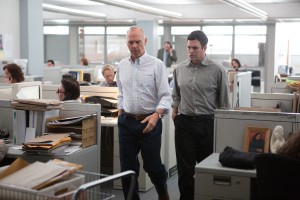In ‘Spotlight,’ Investigative Journalism Shines Light on Evil

Michael Keaton as Walter ‘Robby’ Robinson, Liev Schreiber as Marty Baron, Mark Ruffalo as Michael Rezendes, Rachel McAdams as Sacha Pfieffer, John Slattery as Ben Bradlee Jr., and Brian d’Arcy James as Matt Carroll in ‘Spotlight.’
It’s been a long year and, frankly, I’d given up hope. Not that I expect sympathy, but heavens! the misery I’ve endured for you people. My motto as a critic has always been “I see the crap so you don’t have to.”
But still—Jurassic World turned out to be as scary as a wet, rubber boot. If boredom could be represented by monochromatic muted tones, then calling it Fifty Shades of Grey was putting it mildly. Age of Ultron made me want to eat plutonium and if Lincoln had been forced to sit through The Last Witch Hunter he would have shot himself. I had to watch Adam Sandler luxuriate in his stunted emotional growth … again! … and I still wake screaming from a recurring nightmare in which I’m a studio executive forced to green-light a sequel to The Intern.
So here we are at year’s end and I’m wondering “why bother?”
And then I see Spotlight.
Holy smokes! This is one great movie.
Quality in All Aspects
Advance word had been quite positive and I was looking forward to seeing it … but I had no idea! There’s a chance I may run out of laudatory adjectives before I reach the end of this review, but let’s give it a whirl.
In 2003 the Boston Globe won a Pulitzer Prize for coverage of the decades-long scandal of child sex abuse by priests in the Catholic Archdiocese of Boston and the equally-as-long cover-up by the higher-ups.
The news was broke by the Globe’s “Spotlight” team—a group of four investigative reporters who would work on one story at a time, often for more than a year, before publishing their work.

A team meeting.
It was thanks to the team’s in-depth and dogged journalism that the Church was finally made to answer for the thousands of children who’d been abused over the decades and for the practice of transferring more than 150 pedophile priests from parish to parish, rather than turning them over to law enforcement. The Globe’s coverage led to the resignation of Archbishop Cardinal Law and prompted many of the successful investigations that occurred in dioceses around the world.
But the focus of Spotlight is not on the pain and misery of the victims, nor is it a stealth attack on the Catholic Church. Just as All the President’s Men wasn’t about President Nixon and the Watergate break-ins but how a newspaper broke the story, Spotlight is an edge-of-your-seat thriller about a group of fiercely dedicated people working tirelessly to uncover a horrendous evil.

Michael Keaton, (l) (as Walter ‘Robby’ Robinson) and Mark Ruffalo (r) as Michael Rezendes discuss the story while walking through the ‘Globe’ newsroom
What gets me most is how such a spectacularly-made film was created by, well not exactly newbies, but two people whose previous work only hinted at something this big down the road. Tom McCarthy is the director and, with Josh Singer, wrote the screenplay. McCarthy is a sometime actor (he played Scott Templeton on The Wire) and wrote and directed two highly regarded indie films, The Station Agent and The Visitor. (Compassion forbids my mentioning that his most recent writing/directing project was a huge Adam Sandler bomb called The Cobbler.) One of Singer’s biggest gigs was the two years he spent as writer/story editor on The West Wing and the recent flop screenplay he wrote about Julian Assange, The Fifth Estate. Not bad credits, certainly, but nothing that sets you up for the towering cinematic achievement of Spotlight.
This is a script which resolutely avoids sensationalism and sentimentality, rejecting well-worn Hollywood tropes in favor of accuracy and truth. In other hands, several of the supporting characters would have been combined into one, small moments would have been telescoped into a Big Event … and at some point some writer would have added both a car chase and a sub-plot in which two of the reporters fall in love.
But McCarthy and Singer are smart enough to know that everything they need to make an incredibly absorbing film is right in front of them, and I ferociously applaud them for not taking the easy path. You’d never believe that watching people read court documents could be more tension-filled than all the CGI monsters in the world.
Spotlight, like investigative journalism itself, is made up of small moments, scraps of dialogue and information coming at you from disparate sources. McCarthy and Singer, like the Spotlight team, assemble their finished product one piece of the puzzle at a time and have enough faith in their audience to never dumb down the script or smooth away the complexities. While there are certainly characters you’re rooting for, no one in the movie is without faults. McCarthy and Singer never shy away from portraying the all-too-human humanity of these people.
As a director, McCarthy has put together an impeccable team of actors and guides them flawlessly through this dense, intense script; his years as an actor pay off beautifully. It’s difficult—if not reductive—to single out one performance from what is an extraordinary ensemble effort, so let me mention Mark Ruffalo, Michael Keaton, Rachel McAdams, Liev Schreiber. John Slattery, Brian d’Arcy James, and Stanley Tucci as the outstanding principal cast, with Billy Crudup, Neal Huff, Jamey Sheridan, Michael Cyril Creighton, and Jimmy LeBlanc providing rock-solid support as finely detailed supporting characters.
The Demise of Investigative Journalism?
I do have to say, however, that I left the theater in a decidedly depressed mood. On one hand, Spotlight is a monument to newspaper reporting and the people who make it possible. Without the financial commitment the Boston Globe made to bankroll a team of journalists who might not publish a story from one year to the next, the horror of what happened to those children might never have been brought to light.
But guess what? Newspapers are dying out and as ad revenue sinks, one of the first areas to be cut back is the in-depth work highlighted in the movie. And it’s not like the Internet is stepping in to fill the void. This sort of reporting is very costly and who would pay for it? So we now have the sorry fact of people commenting online about something they read online from someone who read online about something someone read online … and then calling it news. I don’t know all the qualities that make a good reporter, but I do know that leaving your house now and again is essential.
But the saddest question of all is: Who would read serious journalism anyway? We’ve been so conditioned to be fed a steady stream of celebrities, sports, and scandals that we’ve lost the appetite. So while the people in charge do dreadful things behind locked doors, all we want are videos of cats and pictures of Justin Bieber’s penis.
Spotlight powerfully makes the devastating claim that we’ve lost something essential.
Photo Credits: Kerry Hayes / Distributor: Open Road Films
Ted Hoover is a Pittsburgh-based writer and critic.
Share on Social Media
Follow Entertainment Central
Latest Stories
Sign up for the EC Newsletter







